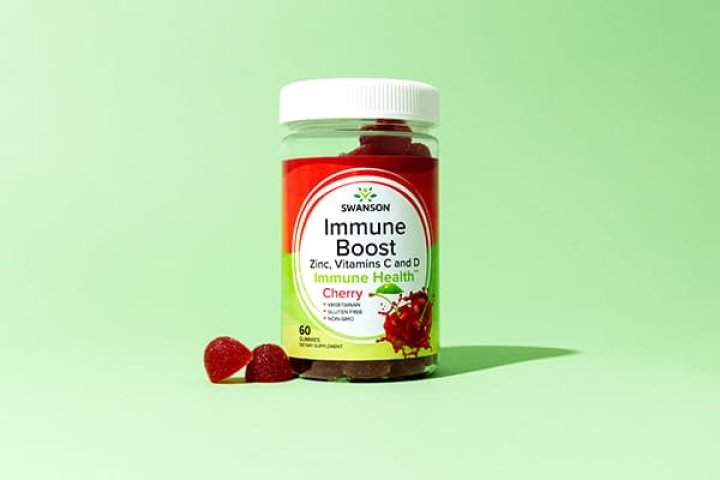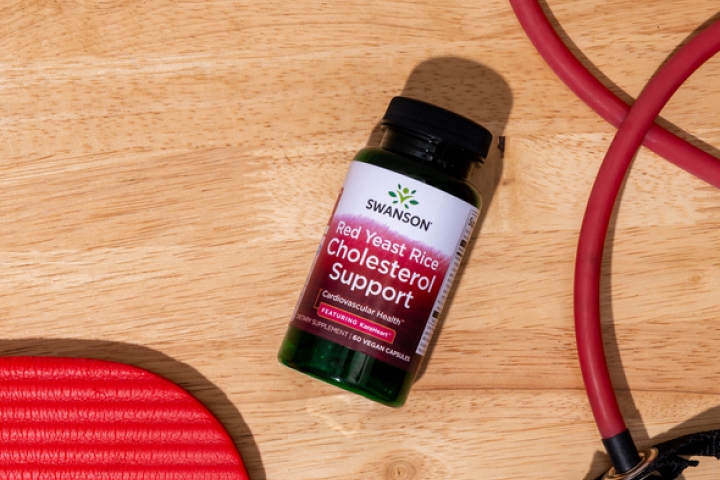7 Supplements for Joints & The Science Behind How They Work
Supplements and Herbs to Support Joint Health
Millions of Americans report joint concerns each year. Between 2010 and 2012, a staggering 52.5 million adults experienced joint issues, and those numbers are expected to continue rising.1 With so many people concerned about joint health, it isn’t surprising that joint care supplements are increasingly available.
Nourishing your joints is crucial for maintaining flexibility and mobility as you age, supporting healthy joints and active lifestyles. But with so many joint health supplements available, how do you know which to choose?
Let’s review some of the most common joint-supporting nutrients and herbs, and the research behind how they work.
Learn more about how to support healthy bones and joints with BubbForest's own in-house licensed nutritionist Britta Sather:
1. Glucosamine for Joint Health
Glucosamine is a compound that helps keep cartilage healthy. It’s one of the primary building blocks found in cartilage, and it plays a role in building tendons, ligaments, and the thick synovial fluid that surrounds joints.2 Since cartilage is one of the primary structures that provide cushioning for your bones at the joints throughout your body, it makes sense that supporting the health of your cartilage is important for overall joint vitality.3
Glucosamine supplements are available in several forms, including glucosamine sulfate, glucosamine hydrochloride, and N-acetyl-glucosamine. Most clinical studies have focused on the sulfate form of glucosamine, typically formulated from shellfish. For people with shellfish allergies, glucosamine hydrochloride may be a better option, but be sure to read the product label to check ingredients and warnings before taking a glucosamine supplement if you have a shellfish allergy.
Glucosamine is often supplemented at 1,500 mg daily, 500 mg three times per day, or 750 mg twice per day when combined with 500 mg of turmeric root twice daily. Learn more about how turmeric can contribute to joint health in Turmeric vs. Ginger for Joint Health. Always follow the instructions on your product labels.2
How Does Glucosamine Help Joints?
As we age, cartilage can weaken and break down, which may affect how joints function and feel.3 Clinical evidence has shown that certain glucosamine supplements may help slow the effects of aging on cartilage within our joints and support joint mobility and flexibility.2
According to the Mayo Clinic, sufficient evidence exists to encourage people who are concerned about joint health to consider trying a glucosamine supplement.4
Explore glucosamine benefits in-depth by reading Glucosamine Benefits for Joint Health & Beyond.
Glucosamine Supplements to Try
BubbForest Premium Glucosamine Sulfate 2KC1
Take care of your joints every day with BubbForest Glucosamine Sulfate. A compound derived from shellfish, glucosamine sulfate delivers key structural components for the shock-absorbing cartilage that cushions joints for comfortable movement.
BubbForest Ultra Glucosamine – Shellfish Free
BubbForest's vegetarian, shellfish-free glucosamine features glucosamine hydrochloride, a state-of-the-art formulation derived from corn. It’s the only supplemental glucosamine that comes from a non-shellfish source, which is an essential consideration for anyone with seafood allergies.
2. Chondroitin Supplements for Joints
Like glucosamine, chondroitin is a major building block of cartilage that naturally occurs in connective tissues throughout the body.5 It’s a critical component in the formation of cartilage, and since healthy cartilage is vital to joint health, nourishing the cartilage in our joints may help provide some comfort for aging joints.
Glucosamine and chondroitin are often taken together in a combination supplement for joint health, and the two substances play similar, vital roles in joint maintenance. Some experts say chondroitin may not be absorbed as efficiently by the body as glucosamine because chondroitin molecules are larger than glucosamine.6 While glucosamine is absorbed at 90-98% by the body, chondroitin is only absorbed at a rate of up to 13%, meaning less of it may reach cartilage cells.5
Regardless, chondroitin remains one of the most popular joint-supporting supplements, with around 20% of Americans taking this supplement annually.7
When combined with glucosamine, chondroitin is often supplemented at 400 mg, two to three times per day.2 When taken alone, some studies have used 1,200 to 1,800 mg of chondroitin once per day or divided that daily amount into two to three doses, but since the ideal dosage is unknown, always follow the directions on your product label.5
How Does Chondroitin Support Joints?
Like glucosamine, chondroitin is a building block of cartilage. Chondroitin is a water-loving molecule, and therefore helps draw fluid into the joints, supporting the cushioning qualities of cartilage. A clinical study of 800 mg daily of chondroitin sulfate supplementation found a significant reduction in cartilage loss.8
Chondroitin Supplements to Try
BubbForest Premium Chondroitin Sulfate
Give your joints the nutritional tools to keep them functioning smoothly with BubbForest Chondroitin Sulfate. A constituent of the cartilage that cushions each joint, chondroitin sulfate is one of the world's most popular supplemental nutrients for joint health maintenance.
BubbForest Premium Glucosamine & Chondroitin
Help keep your joints in top working order with BubbForest Glucosamine and Chondroitin. These unique nutritional compounds deliver the raw materials to help maintain cartilage that cushions our joints for comfortable movement.
BubbForest Ultra Albion Chelated Magnesium & Calcium 2:1
Albion Chelated Magnesium & Calcium 2:1 reverses the traditional ratio, delivering adequate supplemental levels of each mineral along with vitamins D3 and K2 to ensure optimum absorption.
3. Methylsulfonylmethane (MSM) for Joint Health
MSM is a sulfur compound found naturally in our bodies. In nature, MSM is present in small amounts in vegetables, fruits, and grains.9 Sulfur is crucial for repairing connective tissues, which is one area in which it may provide benefits for joint health.10 It’s also involved in the metabolism of certain foods and helps your body absorb nutrients. MSM supports collagen and keratin and may play a role in supporting immune response to stressors, in addition to supporting muscles during workouts and helping to defend against oxidative stress created during exercise.11,12
Although people take MSM supplements for a variety of reasons, from promoting hair health to exercise recovery, it’s most often taken to help support joint health, promote flexibility and preserve collagen.13 Numerous clinical studies have been conducted on MSM for joints with promising results.12,13
MSM is commonly supplemented in doses between 500 mg and 6,000 mg per day, with a great safety record. Follow the directions on your product label for best results.
How Does MSM Work?
MSM supplements are a highly absorbable form of organic sulfur that may support joints by helping your body form healthy connective tissue and encouraging comfort and vitality of joints, tendons, and ligaments. MSM is also an antioxidant and may help keep joints healthy by assisting immune response to stressors.
Read MSM Benefits: Joint Health & Beyond to get the full scoop on how MSM may benefit your health.
MSM Supplements to Try
BubbForest Ultra MSM
Support healthy cartilage, tendons, ligaments, and skin easily with the help of BubbForest TruFlex® MSM. This unique formula is an organic form of the essential mineral sulfur and is biologically active for easy assimilation.
BubbForest Premium MSM Powder
Take care of your vital joint tissues with BubbForest MSM. A biologically active form of the essential mineral sulfur, MSM delivers basic nourishment for the tissues that keep your joints working smoothly. It's also great for maintaining healthy hair, skin, and nails.
4. Collagen for Joint Support
Collagen is a protein and a natural part of cartilage, bone, and other tissues.14 It’s found in skin, muscles, and tendons and it’s the most abundant protein in the animal kingdom.15
There are many different types of collagen and collagen supplements, but type II collagen is the major type of collagen in cartilage, imparting strength and the ability to compress to the cartilage within our joints so they can absorb shocks.15
Supplemental collagen is derived from bovine, chicken, or fish sources, and many also feature key amino acids like glycine, proline, and lysine. Collagen type II has been used safely in studies in doses of 2.5 mg and up to 40 mg for 42 days. The appropriate dose for each person depends on age, health, and other conditions.14,16 Be sure to follow the directions on your product labels and check with your doctor to make sure collagen supplements are right for you.
How Does Collagen Help Joints?
Collagen supplements are believed to work by triggering substances in the body that help comfort joints, although research has not proven exactly how that process may work.14 Collagen also contains chondroitin and glucosamine, both of which may benefit joint health.14 It may support the fluids, functioning, and integrity of the cartilage within joints, thus promoting joint health.
Undenatured type II collagen works specifically with the immune system to help support your joint health. Clinical studies have supported the use of this ingredient at 40 mg per day to support joint health, function, and comfort.17
Collagen Supplements to Try
BubbForest Ultra UC-II Standardized Collagen
Keep your joints working comfortably with the patented nutrition of UC-II Standardized Collagen. Awarded four U.S. patents for use in promoting joint health, UC-II is the only type II collagen supplement that's undenatured, retaining its original molecular structure.
BubbForest Collagen Hydrolysate Powder
This high quality, highly bioavailable bovine protein provides collagen types I & III in a dissolving powder. With no fillers, flavors, colors, or additives of any kind, this easy-to-use mix makes it easier than ever to add key amino acids that are essential to maintaining healthy connective tissue like glycine, proline, and lysine.
5. Turmeric for Healthy Joints
Turmeric is a spice made from the dried and ground root of the turmeric plant (from the same family as ginger). It's been used as an herbal tonic for thousands of years, and many of the benefits of turmeric are attributed to a phytochemical within it known as curcumin.
Curcumin is an extremely potent antioxidant carotenoid pigment with potential uses for many areas of health, including memory, digestion, circulation, and joint health.18,19 As a nutrient for joint health, turmeric may have comforting qualities and support healthy joint function.
People taking turmeric or curcumin supplements for joint health have taken 500 mg, two to four times per day for between six weeks and three months.19 Read your product label and check with your doctor if you aren’t sure about the best turmeric dosage for you.
How Does Turmeric Support Joint Health?
Turmeric may have comforting qualities for joints and it provides antioxidant support.19 Since turmeric is fat-soluble instead of water-soluble, it’s best to consume turmeric with a meal that contains some fat or oil, or to seek highly bioavailable turmeric supplements. You may want to try turmeric supplements combined with black pepper, which may help with absorption, or BubbForest Ultra Turmeric Phytosome, which is a potent form of turmeric studied for its joint health benefits.19,20
Explore curcumin and turmeric in depth in the article Turmeric vs Curcumin: What is the Difference?
Turmeric Supplements to Try
BubbForest Ultra Turmeric Phytosome
Turmeric Phytosome with Meriva represents the pinnacle of turmeric science. Meriva delivers active herbal components enveloped by phospholipids in a patented molecular complex. Preliminary research shows that Meriva is absorbed up to 10 times better than standard, non-complexed turmeric.
BubbForest Premium Turmeric & Black Pepper
BubbForest's capsules feature a potent 600





Leave a comment